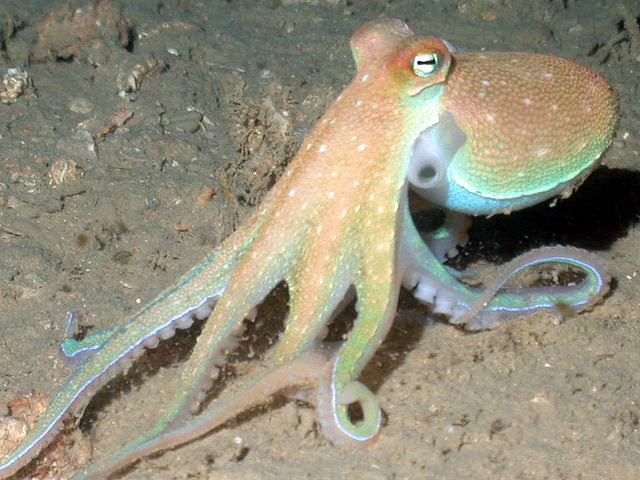
Are You Smarter Than An Octopus?
By Julienne Beblo, guest author
You have probably heard that octopuses are thought to be one of the most intelligent animals in the world, but what does that mean? How are we able to judge animal intelligence and why are octopuses so intriguing?

An octopus photographed in Flower Garden Banks National Marine Sanctuary. Photo credit: NURC/UNCW & NOAA
Humans, according to humans, are ranked at the top of the intelligence list, for good reason. We exhibit numerous traits such as self-awareness, complex language systems, the ability to work with tools and create, and long-term memory and planning that allow us to function. These traits are supported by the over 100 billion neurons and complex brain functions that are found within our species. Other mammals and the rest of the vertebrates (i.e. birds and reptiles) also tend to exhibit signs of intelligence, albeit it at a lower levels: some whale species have highly developed social structures and communication methods; chimpanzees are well-documented using natural tools to aid in foraging; elephants have been known to recognize other elephants that they have not seen in years.
This leaves invertebrates, the varied and expansive group of organisms lacking a backbone that includes insects, worms, snails, coral (yes, that’s an animal), and octopuses. Invertebrate species are very capable of surviving but they are rarely associated with the traits that are so often correlated to higher level intelligence. They have a significantly lower number of neurons and are typically found behaving in only ways that are necessary for basic survival. There are some exceptions, like ants having a complex social structure, but usually, the typical “intelligence” traits are limited in these species. The octopus, however, has become a famous outlier.
Each of its eight sucker-covered arms contain an extensive number of neurons resulting in the equivalent of having a “brain” in each appendage that is capable of receiving and processing information about the environment, including taste. This broad sensory system along with the octopus’s actual brain allow for some impressive skills. It can tightly grasp prey and pry open shells, investigate the habitat around itself, latch onto surfaces, etc. Their skin houses a fascinating collection of chromatophores, cells that contain pigment and iridescent properties. The chromatophores can be expanded or contracted to mimic the color of the surrounding environment while papillae in the skin also control the texture of the skin to match the habitat as well. This self-induced camouflage is vital for avoiding predation and for catching prey unawares. There is even a species of octopus – the mimic octopus (Thaumoctopus mimicus) – that manipulates its body to look like other marine creatures (i.e. sea snakes and lionfish), many of which are venomous and therefore more likely to be avoided by predatory species.
Some species have been documented digging for and using seashells and coconut shells as tools and protection while other species have collected rocks and positioned them in front of dens as a way to keep safe. There are many anecdotal stories of them escaping from tanks in aquariums and shooting jets of water at particular individuals and equipment. This may sound more entertaining than indicative of intelligence but the stories also indicate that the animals can recognize individual humans and show an element of planning and evaluation of their surroundings. Octopuses have also demonstrated “play” activities in which they have interacted with items even after acknowledging that there was no biological benefit. In essence, they were expending energy to interact with an item that did nothing for their survival.
There is still a lot that is not understood about octopus abilities and behavior, and evaluating levels of intelligence in other organisms can get tricky, even for intelligent human beings. But for an organism without a backbone, that only lives for a few years, and is not a social being, octopuses show remarkable abilities to observe, learn from, and interact with their surroundings.
With their expansive range throughout all of the world’s oceans, octopuses can be found in many of our national marine sanctuaries, although they might be really hard to spot. Good luck finding one!
